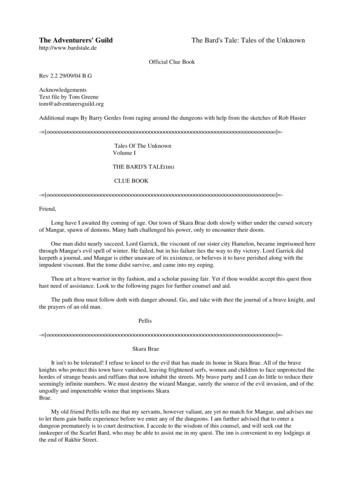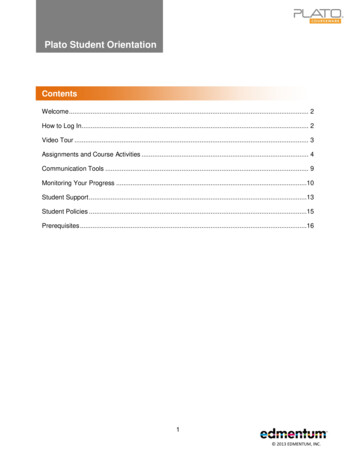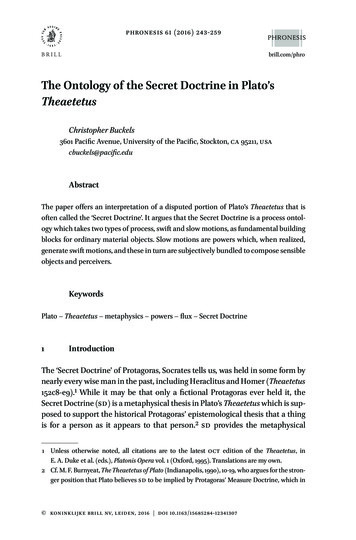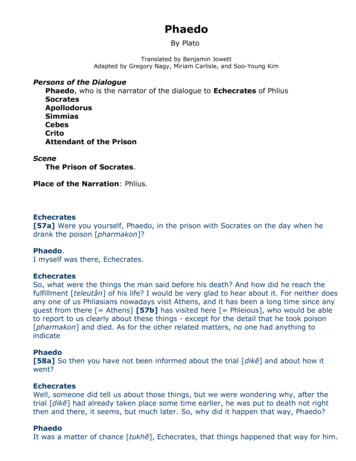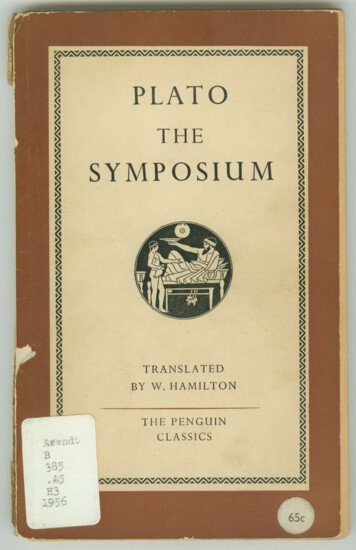
Transcription
PLATOTH ESYMPO SIUMTRANSLATEDBY W. HAMILTONTHE PENGU INCLASSICS
'rHB PBNCUIN CLASSICSEDITED BY B. V. RIEULZ4
THIESY MP OS IUMBY PLATO TRANSL ATEDBY W. HAMILT ONPENG UIN BOOK S
CONTENTS1INTRODUCTIONTHE SYMPOSIUMNOTES11933IIS
PLATO: SYMPOSIU M'Quite clearly, it means love of something.''Take a firm grasp of this point, then,' said Socrates,'rememberin g also, though you may keep it to yourselffor the moment, what it is that Love is love of. Andnow just tell me this: Docs Love desire the thing that heis love of, or not ?''Of course he does.''And docs he desire and love the thing that he desiresand loves when he is in possession of it or when he isnot?''Probably when he is not.''If you reflect for a moment, you will see that it isn'tmerely probable but absolutely certain that one desireswhat one lacks, or rather that one does not desire whatone does not lack. To me at any rate, Agathon, it seemsas certain as anything can be. What do you think?''Yes, I think it is.''Good. Now would anybody wish to be big who wasbig, or strong who was strong?''It follows from my previous admission that this isimpossible.''Because a man who possesses a quality cannot be inneed of it?''Yes.''Suppose a man wanted to be strong who was strong,or swift-footed who was swift-footed. I labour the pointin order to avoid any possibility of mistake, for onemight perhaps suppose in these and all similar cases thatpeople who are of a certain character or who possesscertain qualities also desire the qualities which theypossess. But if you consider the matter, Agathon, you76SOCRATES QUESTION S AGATHONwill see that these people must inevitably possess thesequalities at the present moment, whether they like it ornot, and no one presumably would desire what is inevitable. No, if a man says: "I, who am healthy, or whoam rich, none the less desire to be healthy or rich, as thecase may be, and I desire the very qualities which Ipossess," we should reply: "My friend, what you, whoare in possession of health and wealth and strength,really wish, is to have the possession of these qualitiescontinued to you in the future, since at the presentmoment you possess them whether you wish it or not."Consider, then, whether when you say "I desire what Ipossess" you do not really mean "I wish that I maycontinue to possess in the future the things which Ipossess now.'' If it were put to him like this, he wouldagree, I think.''Yes,' said Agathon.'But this is to be in love with a thing which is not yetin one's power or possession, namely the continuanceand preservation of one's present blessings in thefuture.''Certainly.''Such a man, then, and everyone else who feelsdesire, desires what is not in his present power or possession, and desire and love have for their object thingsor qualities which a man does not at present possess butwhich he lacks.''Yes.''Come then,' said Socrates, 'let us sum up the pointson which we have reached agreement. Arc they notfirst that Love exists only in relation to some object,77I
PLATO: SYMPOSIUMand second that that object must be something of whichhe is at present in want ?''Yes.''Now recall also what it was that you declared inyour speech to be the object of Love. I'll do it for you,if you like. You said, I think, that the troubles amongthe gods were composed by love of beauty, for therecould not be such a thing as love of ugliness. Wasn'tthat it?''Yes.''Quite right, my dear friend, and if that is so, Lovewill be love of beauty, will he not, and not love of ugliness?'Agathon agreed.'Now we have agreed that Love is in love with whathe lacks and does not possess.''Yes.''So after all Love lacks and does not possess beauty?''Inevitably.''Well then, would you call what lacks and in no waypossesses beauty beautiful?''Certainly not.''Do you still think then that Love is beautiful, if thisis so?''It looks, Socrates, as if I didn't know what I wastalking about when I said that.''Still, it was a beautiful speech, Agathon. But thereis just one more small point. Do you think that what isgood is the same as what is beautiful?''I do.''Then, if Love lacks beauty, and what is good78AGATHON REDUCED TO HELPLESSNESScoincides with what is beautiful, he also lacks goodness.''I can't find any way of \vithstanding you, Socrates.Let it be as you say.''Not at all, my dear Agathon. It is truth that you findit impossible to withstand; th(;)re is never the slightestdifficulty in withstanding Socrates.'But now I will leave you in peace, and try to give theaccount of Love which I once heard from a woman ofMantinea, called Diotima. She had other accomplishments as well - once, before the plague, when theAthenians had been sacrificing to avert it, she succeededin postponing it for ten years- but what concerns us atpresent is that she was my instructress in the art of love.I will try, taking the conclusions on which Agathon andI reached agreement as my starting-point, to give thebest consecutive account I can of what she told me. Asyou were so careful to point out to us, Agathon, one ,,must elucidate the entialnature and characteristics ofLove before describing his cts. The easiest thingwill be to go through the same questions and answers asshe did with me. I had used very mucl1 the same langq age to her as Agathon used to me, and had said thatLove is a great god and must be reckoned beautiful, butsh employed against me the arguments by which Idemonstrated to Agathon that to my way of thinkingLove is neither beautiful nor good. "What do you mean,Diotima ?" I said. "Is Love ugly and bad?" "Don't saysuch things," she answered; "do you think that anythingthat is not beautiful is necessarily ugly?" "Of course Ido." "And thatanythingthatisnotwisdomi signorance?79-?
I/dV')'"SOCRATES AND DIOTIMAPLATO: SYMPOSIUMDon't you know that there is a state of mind half-waybetween wisdom and ignorance ?" "\Vhat do you mean ?""Having true convictions without being able to give\ reasons for them," she replied. "Surely you see that sucha state of mind cannot be called understanding, becausenothing irrational deserves the name; but it would beequally wrong to call it ignorance; how can one call astate of mind ignorance which hits upon the truth? Thefact is that having true convictions is what I called itjust now, a condition half-way between knowledge andignorance." "I grant you that," said I. "Then do notmaintain that what is not beautiful is ugly, and what isnot good is bad. Do not suppose that because, on yourown admission, Love is not good or beautiful, he muston that account be ugly and bad, but rather that he issomething between the two." "And yet," I said, "everybody admits that he is a great god." "When you sayeverybody, do you mean those who don't know him,or do you include those who do?" "I mean absolutelyeverybody." She burst out laughing, and said: "Well,Socrates, I don't see how he can be admitted to be agreat god by those who say that he isn't even a god atall." ''Who are they?" I asked. ''You are one of themand I'm another." "What can you mean?" "It's perfectly easy; you'd say, wouldn't you, that all gods arehappy and beautiful? You wouldn't dare to suggest thatany of the gods is not?" "Good heavens, no." "And byhappy you mean in secure enjoyment of what is goodand beautiful?" "Certainly." "But you have agreed thatit is because he lacks what is good and beautiful thatLove de3ires these very things." ''Yes, I have." "But aSobeing who has no share of the good and beautiful cannotbe a god?" "Obviously not." "Very well then, you seethat you are one of the people who believe that Love isnot a god."' ''\Vhat can Love be then?" I said. "A mortal?""Far from it." "\Veil, what ?"-"As in my previous examples, he is half-way between mortal and immortal.""\Vhat sort of being is he then, Diotima ?""He is a greatL.J-. -1pirit, Socrates; everything that is ofthe nature of a spirit 'is half-god and half-roan." "And what is the function of'\ /such a being?" "T interpret and convey messages tothe gods from men and to men from the gods, prayersand sacrifices from the one, and commands and rewardsfrom the other. Being of an intermediate nature, aspirit bridges the gap between them, and prevents theuniverse from falling into two separate halves. Throughthis class of being come all divination and the supernatural skill of priests in sacrifices and rites and spells and :? Devery kind of magic and wizardry. God does not dealdirectlY. with man; it is by means of spirits that all theintercourse and communication of gods with men, bothin waking life and in sleep, is carried on. A man whopossesses skill in such matters is a spiritual man, whereasa man whose skill is confined to some trade or handicraft is an earthly creature. Spirits are many in numberand of many kinds, and one of them is Love."' "\Vho are his parents?" I asked. "That is rather along story," she answered, "but I will tell you. On theday that Aphrodite was born the gods were feasting,among them Contrivance the son of Invention; andafter dinner, seeing that a party was in progress, PovertyII81
PLATO: SYMPOSIU MLOVE'S PARENTAG Ecame to beg and stood at the door. Now Contrivancewas drunk with nectar- wine, I may say, had not yetbeen discovered- and went out into the garden of Zeus,and was overcome by sleep. So Poverty, thinking toalleviate her wretched condition by bearing a child toContrivance, lay with him and conceived Love. SinceLove was begotten on Aphrodite's birthday, and sincehe has also an innate passion for the beautiful, and so forthe beauty of Aphrodite herself, he became her followerand servant. Again, having Contrivance for his fatherand Poverty for his mother, he bears the followingcharacter. He is always poor, and, far from being sensitive and beautiful, as most people imagine, he is hardand weather-beaten, shoeless and homeless, alwayssleeping out for want of a bed, on the ground, on doorsteps, and in the street. So far he takes after his motherand lives in want. But, being also his father's son, heschemes to get for himself whatever is beautiful andgood; he is bold and forward and strenuous, alwaysdevising tricks like a cunning hutsman; he yearns afterknowledge and is full of resource and is a lover of wisdomall his life, a skilful magician, an alchemist, a truesophist. He is neither mortal nor immortal; but on oneand the same day he will live and flourish (when thingsgo well with him), and also meet his death; and thencome to life again through the vigour that he inheritsfrom his father. What he wins he always loses, and isneither rich nor poor, neither wise nor ignorant.' "The truth of the matter is this. No god is a lover ofwisdom or desires to be wise, for he is wise already, andthe same is true of other wise persons, if there be anysuch. Nor on the other hand do the ignorant love wisdom and desire to be wise, for the tiresome thing aboutignorance is precisely this, that a man who possessesneither beauty nor goodness nor intelligence is perfectlywell satisfied with himself, and no one who does notbelieve that he lacks a thing desires what he does notbelieve that he lacks."' "Who then," I said, "are the lovers of wisdom, ifthey are neither the wise nor the ignorant?" "A childcould answer that question. Obviously they are theintermediate class, of which Love among others is amember. Wisdom is one of the most beautiful of things,and Love is love of beauty, so itfollows that Love must bea lover of wisdom, and consequently in a state half-waybetween wisdom and ignorance. This too springs fromthe circumstances of his birth; his father was wise andfertile in expedients, his mother devoid of wisdom andhelpless. So much for the nature of the spirit, my dearSocrates. As for your thinking as you did about Love,there is nothing remarkable in that; to judge by whatyou said, you identified Love with the beloved objectinstead of with what feels love; that is why you thoughtthat Love is supremely beautiful. The object of love isin all truth beautiful and delicate and perfect and wortliyto be thought happy, but what feels love has a totallydifferent character such as I have just described."' "Tell me then, my friend," I said, "for your wordscarry conviction, what function Love performs amongmen, if this is his nature." "That is precisely what Iam going to try to teach you, Socrates. The nature andparentage of Love are as I have described, and he is also,8283
PLATO: SYMPOSIUMaccording to you, love of beauty. But suppose we wereto be asked: 'In what does love of beauty consist,Socrates and Diotima ?' or, to put it more .( 'What is the aim of the love which is felt by the lover ofbeauty?' " "His aim is to attain possession of beautifulthings," I answered. "But that merely raises a furtherquestion. What will have been gained by the man whois in possession of beauty?" I said that I could supply noready answer to this question. "\Vell," she said, "letus change our terms and substitute good for beautiful.Suppose someone asked you: 'Now, Socrates, what isthe aim of the love felt by the lover of the good ?' ""Possession of the good," I replied. "And what willhave been gained by the man who is in possession of the?. Dgood?" "I find that an easier question to answer; he willbe happy." "Presumably because happiness consists inthe possession of the good, and once one has given thatanswer, the inquiry is at an end; there is no need to askthe further question 'Why does a man desire to behappy?' " "Quite so."' "Now do you suppose that this desire and this loveare characteristics common to all men, and that all perpetually desire to be in possession of the good, or what?""That is exactly what I mean; they are common to allmen." "\Vhy is it then, Socrates, if all men are always inlove with the same thing, that we do not speak of allmen as being in love, but say that some men are in loveI and others not ?" "I wonder what the reason can be.""Then 's no need to wonder; the truth is that we isolatea particular kind of love and appropriate for it the nameof love, which really belongs to a wider whole, while we-84LOVE IN ITS WIDEST SENSEemploy different names for the other kinds of love.""Can you give me another example of such a usage?"''Yes, here is one. By its original meaning J?Oet!J meanssimply creation, and creation, as you know, can take veryvarious forms. Any action which is the cause of a thingemerging from non-existence into existence might becalled poetry, and all the processes in all the crafts arekinds of poetry, and all those who are engaged in thempoets." ''Yes." "But yet they are not called poets, buthave other names, and out of the whole field of poetryor creation one part, which deals with music and metre,is isolated and called by the name of the whole. Thispart alone is called poetry, and those whose province isthis part of poetry are called poets." "Quite true." "Itis just the same with love. The generic concept embraces every desire for good and for happiness; that isprecisely what almighty and all-ensnaring love is. Butthis desire expresses itself in many ways, and those withwhom it takes the form of love of money or of physicalprowess or of wisdom are not said to be in love or calledlovers, whereas those whose passion runs in one particular channel usurp the name of lover, which belongs tothem all, and are said to be lovers and in love." "Thereseems to be truth in what you say," I remarked. "Thereis indeed a theory," she continued, "that lovers arepeople who are in search of the other half of themselves,but according to my view of the matter, my friend, loveis not desire either of the half or of the whole, unless thathalf or whole happens to be good. Men are quite willingto have their feet or their hands amputated if they believe those parts of themselves to be diseased. The-Huth f.,.-85
PLATO: SYMPOSIUM-is, I tl!,ink, t people are not attached to what particularly belongs to them, except in so far as they canidentify what is good with what is their own, and what isbad with what is not their own. The only object ofmen's love is what is good. Don't you agree?" "Certainly I do." "May we then say without qualificationthat men are in love with what is good?" "Yes." "Butwe must add, mustn't we, that the aim of their love isthe possession of the good for themselves ?" "Yes.""And not only its possession but its perpetual possession?" "Certainly." "To sum up, then, love is desirefor the perpetual possession of the good." "Verytrue."'"Now that we have established what love invariablyis, we must ask in what way and by what type of actionmen must show their intense desire if it is to deserve thename of love. What will this function be? Can you tellme?" "If I could, Diotima, I should not be feeling suchadmiration for your wisdom, or putting myself to schoolwith you to learn precisely this." "Well," she said, "Iwill tell you. The function is that of procreation in whatis beautiful, and such procreation can be either physicalor spiritual." "What you say needs an interpreter. Idon't understand." "I will put it more plainly. All men,Socrates, are in a state of pregnancy, both spiritual andphysical, and when they come to maturity they feel anatural desire to bring forth, but they can do so only inbeauty and never in ugliness.27 There is somethingdivine about the whole matter; in pregnancy and bringing to birth the mortal creature is endowed with atouch of immortality. But the process cannot take place86PROCREATION THE FUNCTION OF LOVEin disharmony, and ugliness is out of harmony witheverything divine, whereas beauty is in harmony withit. That is why Beauty is the goddess who presides overtravail, and why, when a person in a state of pregnancycomes into contact with beauty, he has a feeling ofserenity and happy relaxati Jn which makes it possibleto bring forth and give birth. But, when ugliness is near,the effect is just the opposite; he frowns and withdrawsgloomily into himself and recoils and contracts andcannot bring forth, but has painfully to retain theburden of pregnancy. So a person who is pregnant andalready great with child is violently attracted towardsbeauty, because beauty can deliver its possessor from thepains of travail. The object of love, Socrates, is not, asyou think, beauty." "What is it then?" "Its object is toprocreate and bring forth in beauty." "Really?" "It isso, I assure you. Now, why is procreation the object oflove? Because procreation is the nearest thing .E e tui!J d immortalitY-.that a mortal being can attain.If, as we agreed, the aim of love is the perpetual possession of the good, it necessarily follows that it must e immortality together with the good, and theargument leads us to the inevitable conclusion that loveJs k ve oJ.immor.tality as well as of th e good."'All this, then, I learnt on the various occasions onwhich Diotima spoke to me on the subject of love. Oneday she asked me: "What do you suppose, Socrates, tobe the cause of this love and this desire? Look at thebehaviour of all animals, both beasts and birds. Whenever the desire to procreate seizes them, they fall a preyto a violent love-sickness. Their first object is to achieve87
PLATO: SYMPOSIUMunion with one another, their second to provide fortheir young; for these they are ready to fight howevergreat the odds, and to die if need be, suffering starvationthemselves and making any other sacrifice in order tosecure the survival of their progeny. With men yonmight suppose such behaviour to be the result of rationalcalculation, but what cause is to be ascribed for theoccurrence of such love among the beasts? Can you tellme?" I again confessed that I didn't know. "How canyou expect ever to become an expert on the subject oflove, if you haven't any ideas about this?" "I told youbefore, Diotima, that this is precisely why I have cometo you. I know that I need a teacher. So tell me thecause of this and of all the other phenomena connectedwith love."'"Well, if you believe that the natural object of loveis what we have more than once agreed that it is, theanswer won't surprise you. The same argument holdsgood in the animal world as in the human, and lnature seeks, as far as may be, to perpetuate itself andbecome immortal. The only way in which it can achievethis is by procreation, which secures the perpetualreplacment of an old member of the race by a new.Even during the period for which any living being issaid to live and to retain his identity - as a man, forexample, is called the same man from boyhood to oldage - he does not in fact retain the same attributes,although he is called the same person; he is alwaysb oming a new being and undergoing a process of lo!sand reparation, which affects his hair, his flesh, hishones, his blood, and his whole body. And not only his88IMMORTALITY SECURED BY LOVEbody, but his soul as well. No man's character, habits,opinions, desires, pleasures, pains, and fears remainalways the same; new ones come into existence and oldones disappear. What happens with pieces of knowledge ;; tJ is even more remarkable; it is not merely that someappear and others disappear, so hat we no more retainour identity with regard to knowledge than with regardto the other things I have mentioned, but that eachindividual piece of knowledge is subject to the sameprocess as we are ourselves. \Vhen we use the wordrecollection we imply by using it that knowledge departs from us; forgetting is the departure of lmowledge,and recollection, by implanting a new impression in theplace of that which is lost, preserves it, and gives it aspurious appearance of uninterrupted identity. It is inthis way that everything Etortal is preserved; not byremaining for ever the same, which is the prerogativeof divinity, but by undergoing a process in which thelosses caused by age are repaired by new acquisitions of asimilar kind. This device, Socrates, enables the mortalto partake of immortafuy, physically as well as in other .::: ::::ways; but the immortal enjoys immortality afteranother manner. So do not feel surprise that every creature naturally cherishes its own progeny; it is in orderto secure immortality that each individual is haunted bythis eager desire and love."'I was surprised at this account and said: "You maybe very wise, Diotima, but am I really to believe this r»"Certainly you are," she replied in true professionalstyle; "if you will only reflect you \vill see that theambition of men provides an example of the same truth.89
PLATO: SYMPOSIUMSPIRITUAL PARENTAGEYou will be astonished at its irrationality unless youbear in mind what I have said, and remember that thelove of fame and the desire to vin a lory: that shallnever die have the strongest effects upon people. Forthis even more than for their children they are ready torun risks, spend their substance, endure every kind ofhardship, and even sacrifice their lives. Do you supposethat Alcestis would have died to save Admetus, orAchilles to avenge Patroclus, or your Codrus to preserve his kingdom for his sons,28 if they had not believed that their courage would live for ever in mPn'smemory, as it does in ours? On the contrary; it is desirefor immortal renown and a glorious reputation such astheirs that is the incentive of all actions, and the better aman is, the stronger the incentive; he is in love 'vith immortality. Those whose creative instinct is physical haverecourse to women, and show their love in this way,believing that by begetting children they can secure forthemselves an immortal and blessed memory hereafterfor ever; but there are some whose creative desire is ofthe soul, and who conceive spiritually, not physically,the progeny which it is the nature of the soul to conceive and bring forth. If you ask what that progeny is,it is \visdom and virtue in general; of this all poets andsuch craftsmen as have found out some new thing maybe said to be begetters; but far the greatest and fairestbranch of wisdom is that which is concerned mth thedue ordering of states and families, whose name ismoderation and justice. When by divine inspiration aman finds himself from his youth up spiritually pregnantwith these qualities, as soon as he comes of due age hedesires to bring forth and to be delivered, and goes insearch of a beautiful environment for his children; for hecan never bring forth in ugliness. In his pregnant condition physical beauty is more pleasing to him than ugliness, and if in a beautiful body he finds also a beautifuland noble and gracious soul, he welcomes the combination warmly, and finds much to say to such a one aboutvirtue and the qualities and actions which mark a goodman, and takes his education in hand. By intimateassociation with beauty embodied in his friend, and bykeeping him always before his mind, he succeeds inbringing to birth the children of which he has been longin labour, and once they are born he shares their upbringing 'vith his friend; the partnership between themwill be far closer and the bond of affection far strongerthan between ordinary parents, because the childrenthat they share surpass human children by being immortal as well as more beautiful. Everyone would preferchildren such as these to children after the flesh. TakeHomer, for example, and Hesiod, and the other goodpoets; who would not envy them the children that theyleft behind them, children whose qualities have wonimmortal fame and glory for their parents? Or takeLycurgus the lawgiver,29 and consider the children thathe left at Sparta to be the salvation not only of Sparta butone may almost say of Greece. Among you AtheniansSolon is honoured for the laws which he produced,Joand so it is in many other places with other men, bothGreek and barbarian, who by their many fine actionshave brought forth good fruit of all kinds; not a few ofthem have even won men's worship on account of their--
PLATO: SYMPOSIUMspiritual children, a thing which has never yet happenedto anyone by reason of his human progeny.'"So far, Socrates, I have dealt with love-mysteriesinto which even you could probably be initiated, butwhether you could grasp the perfect revelation to whichthey lead the pilgrim if he does not stray from the rightpath, I do not know. However, you shall not fail for anylack of willingness on my part: I will tell you of it, anddo you try to follow if you can.' "The man who would pursue the right way to this.goal must begin, when he is young, by applying himselfto the contemplation of physical beauty, and, if he isproperly directed by his guide, he will first fall in lovewith one particular beautiful person and beget noblesentiments in partnership with him. Later he will observe that physical beauty in any person is closely akinto physical beauty in any other, and that, if he is to makebeauty of outward form the object of his quest, it is greatfolly not to acknowledge that the beauty exhibited in allbodies is one and the same; when he has reached thisconclusion he will become a lover of all physical beauty,and will relax the intensity of his passion for one particular person, because he will realize that such a passionis beneath him and of small account. The next stage isfor him to reckon beauty of soul more valuable thanbeauty of body; the result will be that, when he en.counters a virtuous soul in a body which has little of thebloom of beauty, he will be content to love and cherishit and to bring forth such notions as may serve to makeyoung people better; in this way he will be compelled tocontemplate beauty as it exists in activities and institu-92THE ASCENT TO ABSOLUTE BEAUTY tions, and to recognize that here too all beauty is akin,so that he will be led to consider physical beauty takenas a whole a poor thing in comparison. From.-:rls hemust be directed to the sciences and contemP.late theirbeauty also, so that, having his eyes fixed upon beauty inthe widest sense, he may no longer .be the slave of a baseand mean-spirited devotion to an individual example ofbeauty, whether the object of his love be a boy or a manor an activity, but, by zing upon the vast ocean ofbeauty to which his attention is now turned, may bringforth in the abundance of his love of wisdom manybeautiful and magnificent sentiments and ideas, untilat last, strengthened and increased in stature by this experience, he catches sight of one unique science whoseobject is the beauty of which I am about to speak. Andhere I must ask you to pay the closest possible attention.' "The man who has been guided thus far in the mysteries of love, and who has directed his thoughts towards examples of beauty in due and orderly succession,\rill suddenly: ave revealed to him as he approaches theend of his initiation [beauty vhose nature vellousindeed, the final goal, ' of all his previous efforts.This beauty is first oLalleternal; it neither comes intobeing nor passes away, neither waxes nor wanes; next, it- --Ais not beautiful in part and ugly in part, nor beautiful atone time and ugly at another, nor beautiful in this relation and ugly in that, nor beautiful here and ugly there,as varying according to its beholders; nor again will thisbeauty appear to him like the beauty of a face or handsor anything else corporeal, or like .the- -of -athought or a science, or like beauty which has its seat in.-93
PLATO: SYMPOSIUMTHE LIFE OF THE PHILOSOPHIC LOVERsomething other than itself, be it a living thing or theearth or the sky or anything else whatever; he will seeit a absolute, existing alone with itself, .unique, eternal,and all other beautiful things as partaking of it, yet insuch a manner that, while they come into being and passaway, it neither undergoes any increase or diminutionnor suffers any change.' "\Vhen a man, starting from this sensible world andmaking his vray upward by a right use of his feeling oflove for boys, begins to catch sight of that beauty, he isvery near his goal. This is the right way of approachingor being initiated into the mysteries of love, to beginwith examples of beauty in this
the gods were composed by love of beauty, for there could not be such a thing as love of ugliness. Wasn't that it?' 'Yes.' 'Quite right, my dear friend, and if that is so, Love will be love of beaut
